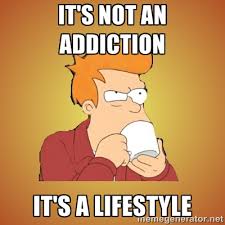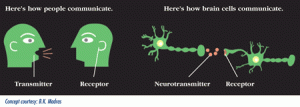I feel that today, the most important things being researched are ways for people to live longer, happier, and healthier lives. For example, either through discovering new medicine, vaccines, or obtaining new/better knowledge on human behavior. Several things are not allowing the average person to have these “better lives.” Data collected in 2010 showed that millions of individuals are affected by some addiction. Addiction causes people to live an abnormal life and can cause shorter life spans. Addiction is when a person is physically or mentally dependent on something else. For instance, a substance or activity (In this blog I will mostly be focusing on drug and alcoholism). If a substance contains enough addictive material, then the user can become hooked after just one use. Studies show that consistent drug use alters the brain’s functionality. It is understood that there is the connection between constant use and how the brain processes satisfaction. If the brain notices that the action has a pleasurable outcome, a person will start to do it more often, and it could eventually lead to a dependency. The most important question I would like to have an answer to by the end of my research is: Can an addict return to a normal, nondependent life after longterm drug use?
To know if it is possible to break an addiction, we must know what causes an addiction to starting in the first place. Several different factors cause the development of addiction. 1.) Genetics plays a part. If a family member has or had an addiction, their descendants are more likely to become addicted to something. 2.) Mental status is also a factor. If a person is alone or has a mental illness, they too are more susceptible to become an addict. 3.) According to this article, males are more likely to become addicts than females are. 4.) Lastly, the substance or activity that is used impacts the severity of the addiction. Certain drugs are very addictive; Used even once, it can cause a person to become dependent.
When a person is dependent on something, there are usually signs. First off, and probably the most obvious is that they can not stop. It clearly shows they need it and are addicted. Next, even when there are apparent changes in their health, they will continue to feed their addiction. This shows the phenomenon known as denial and is another sign of dependency. For example, a drug addict might tell themselves that the drug is not causing them to feel ill. They will blame it on anything besides the drug because they do not want anything interfering with using. Also, an addict will give up other things for their addiction. Like not being as social, giving up other hobbies, and spending an excessive amount of money. Lastly, if they do not satisfy their addiction, they will show signs of withdrawal. Withdrawal is when the addict is no longer fulfilling their addiction. This causes both physical and mental consequences. Their mood will rapidly change, they could start to feel empty without it and tend to become depressed. On top of that, they might go through spurts of time where they both shake and sweat an inordinate amount.
Now that we understand the basics of addiction, it is important to see real life experiments done on the topic. A study was conducted by a group of researchers, who believed that there is a particular neuron in the brain that provides the sense of reward from feeding an addiction. They wanted to know if there was a way to block these neurons, and stop an addiction. In this case, the addiction is alcohol, and it is tested on rats. For this experiment, mice were injected with a concoction that would render alcohol-linked neurons inactive. This means that the substance would not allow the mice to distinguish drinking and the feeling of getting drunk. The rats could still be able to get drunk, but they would not be able to make the conscious link between drinking a lot and the pleasurable feeling of being intoxicated. The null hypothesis was that the created concoction would not stop the rats from binge drinking. The alternative hypothesis was that the concoction would cause the rats to be no longer addicted to drinking alcohol.
To start, the researchers gathered rats and made them addicted to alcohol. Next, they split the rats into two groups; One receiving the injection (Experimental group), while the other did not (Controlled group). After that, they had provided each rat two pumps. One containing alcohol and the other holding sugar water. They observed and recorded the results. They noticed that the rats that had received the injection had completely stopped being dependent on alcohol, and their compulsive drinking habits stopped. On the other hand, the other group continued to drink excessively. This lasted the entire time the rats were monitored, and the study was repeated a second and a third time. Each experiment presented relatively the same results. These repeated results supported the alternative hypothesis. This provided strong evidence that that the root of addiction is found in the brain, and that if specific neurons are blocked, an addiction can be stopped in it’s tracks. These results could be due to chance (most likely not though), but third variables are ruled out. It was a controlled experiment which blocked specific neurons in the brain, eliminating the possibility that the results were due to other variables. Reverse causation could also be ruled out for that same reason.
After this experiment, the next step would be to find a way to convert this newfound knowledge to humans. Either through conducting human experiments or developing medicine to manipulate the link between addition and the reward it provides. With the results of the experiment, it is evident an addiction can be broken. Until a standardized form of medication comes out blocking neurons in the brain, addicts must recover in a more conventional way. The first step in stopping an addiction is acknowledging that the addict has a problem and that they are not in control. After the first, and arguably the most important step, they must seek out help. Either treatment centers or psychologists. Here they will have people to support them battle the addiction, and set them on the right path to living a normal life again. With constant comfort, and eventually new medication, it is possible for an addict to return to an ordinary life.
Sources:
Articles:
http://www.medicalnewstoday.com/info/addiction/signs-of-addiction.php
http://www.addictionsandrecovery.org/withdrawal.htm
http://www.scripps.edu/newsandviews/e_20160912/george.html
New Data Show Millions of Americans with Alcohol and Drug Addiction Could Benefit from Health Care R
Pictures:
https://www.drugabuse.gov/publications/drugs-brains-behavior-science-addiction/drugs-brain
https://memegenerator.net/instance/35161408



This post was very well done, especially when you concluded by saying how addiction may be better fought in the years to come. Addiction is without a doubt a psychological issue, so studies that determine the part of the brain that is afflicted by addiction would be the first step in finding a successful medication